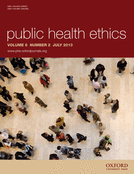-
Views
-
Cite
Cite
Annelien L. Bredenoord, Noor A. A. Giesbertz, Johannes J. M. van Delden, Consent for Medical Device Registries: Commentary on Schofield, B. (2013) The Role of Consent and Individual Autonomy in the PIP Breast Implant Scandal, Public Health Ethics, Volume 6, Issue 2, July 2013, Pages 226–229, https://doi.org/10.1093/phe/pht021
Close - Share Icon Share
Abstract
The clinical introduction of medical devices often occurs with relatively little oversight, regulation and (long-term) follow-up. Some recent controversies underscore the weaknesses of the current regime, such as the complications surrounding the metal-on-metal hip implants and the scandal surrounding the global breast implant scare of silicone implants made by France's Poly Implant Prothese (PIP) Company. The absence of national registries hampered the collection of reliable information on the risks and harms of the PIP breast implants. To warrant long-term safety, a case can be made for mandatory post-marketing surveillance by means of the establishment of compulsory registries. In this edition of Public Health Ethics, Schofield calls for debate on how such a registry system should be initiated and maintained and how it would relate to the ethical requirement of consent. Here we use breast implant registries as a case to discuss whether and when a so-called ‘thick opt-out’ would be an appropriate method to include people in medical device registries. We conclude that a thick opt-out procedure for medical device registries is only justifiable in cases where inclusion does not involve burdens (or very low), when it does not involve a sensitive subject and when the data are stored anonymously (or at least not directly linked to the medical record). Otherwise, inclusion should be sought by means of an opt-in.



